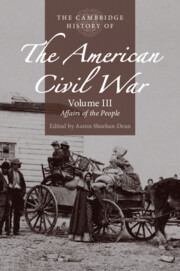Book contents
- The Cambridge History of the American Civil War
- The Cambridge History of the American Civil War
- The Cambridge History of the American Civil War
- Copyright page
- Contents
- Plates
- Figures
- Contributors to Volume III
- Note on the Text
- Part I Values
- 1 Wartime Masculinities
- 2 Northern Women and the Civil War
- 3 Southern Women and the Civil War
- 4 Religion in the Civil War Era
- 5 Economic and Social Values in the Civil War
- Part II Social Experience
- Part III Outcomes
- Index
- Plate Section (PDF Only)
- References
4 - Religion in the Civil War Era
from Part I - Values
Published online by Cambridge University Press: 11 October 2019
- The Cambridge History of the American Civil War
- The Cambridge History of the American Civil War
- The Cambridge History of the American Civil War
- Copyright page
- Contents
- Plates
- Figures
- Contributors to Volume III
- Note on the Text
- Part I Values
- 1 Wartime Masculinities
- 2 Northern Women and the Civil War
- 3 Southern Women and the Civil War
- 4 Religion in the Civil War Era
- 5 Economic and Social Values in the Civil War
- Part II Social Experience
- Part III Outcomes
- Index
- Plate Section (PDF Only)
- References
Summary
The American Civil War was not a war of religion. The divisions within America’s most important denominations by the war’s beginning were the result of differing and patently sectional ideas about slavery, and not doctrine. The majority of the war’s nearly 4 million armed participants from both the North and the South were Protestants of one kind or another. Ethnically identifiable and predominantly Catholic regiments like those that made up the Union’s Irish Brigade were of a kind with the Confederacy’s 24th Georgia and 10th Louisiana Infantries. Of only 150,000 Jews in America in 1861, 6,000 Jewish men wore Union blue and likely 3,000 or so Confederate gray. Not only was America’s greatest existential crisis not a war of religion then, in many ways it was the very antithesis of a war of a religion. During the American Civil War, Protestant, Catholic, and Jewish Americans on both sides of the conflict made war against their fellow believers in spite of the overwhelmingly similar religious traditions they shared.
- Type
- Chapter
- Information
- The Cambridge History of the American Civil War , pp. 70 - 90Publisher: Cambridge University PressPrint publication year: 2019

